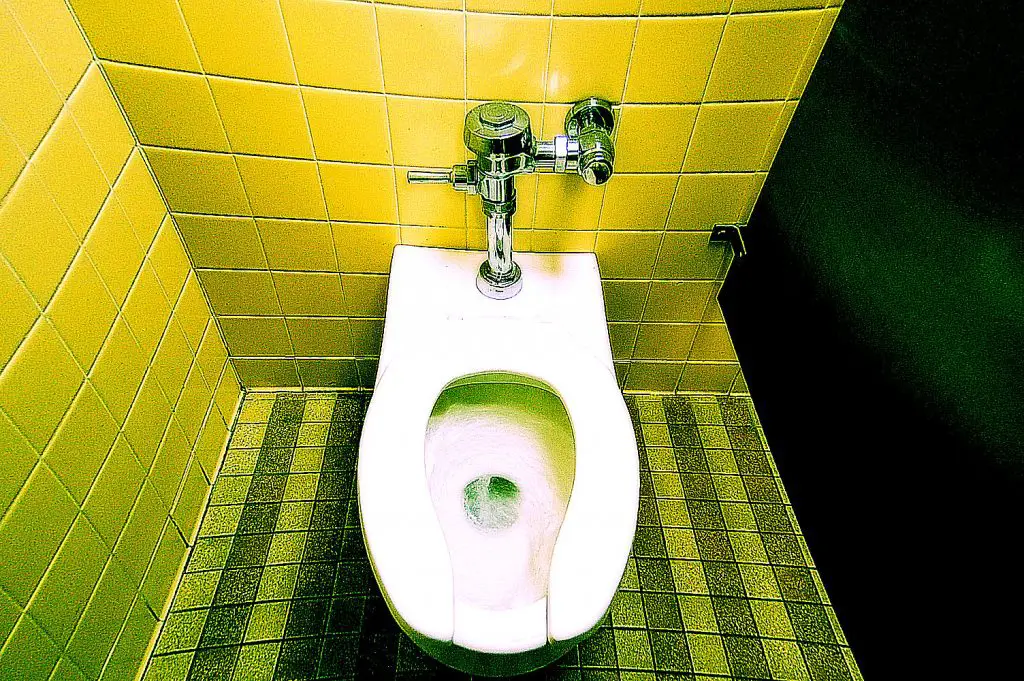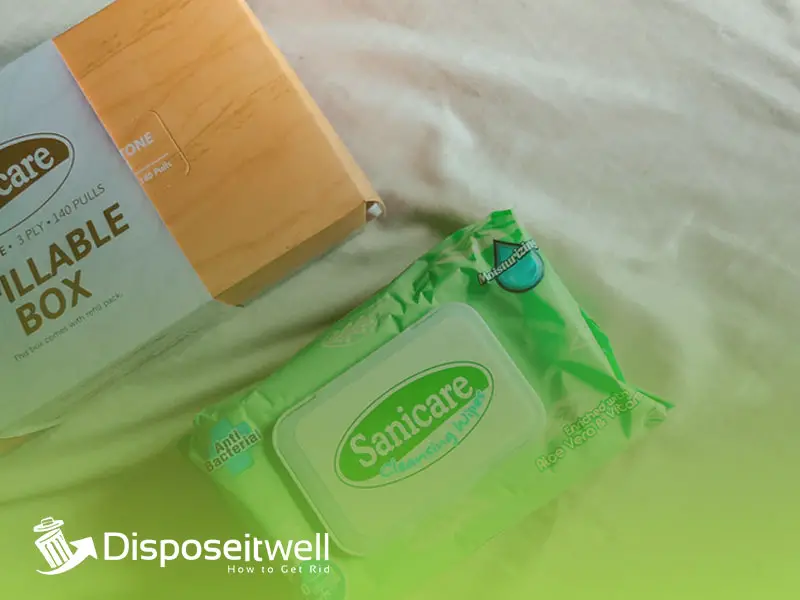If you’re someone who uses flushable wipes, you might be wondering how to dispose of flushable wipes when you are done with them. Don’t fret! We are here to help you.
While most brands of flushable wipes are designed to disintegrate in the water, there are some products on the market that don’t break down as easily. This can cause clogs in your plumbing and septic system.
In this blog post, we’ll show you several ways of disposing of these stubborn items like using only a small amount of flushable wipes at a time, and many more solutions, so that they don’t cause problems for your plumbing.
How to dispose of flushable wipes?
Here are some of the most useful methods to get rid of flushable wipes.
Secure the wipes in a plastic bag, knot the top of the bag, and discard it in your garbage can.
This method prevents the wipes from getting stuck in pipes or clogging up sewer systems.
Compost the wipes:
If the wipes are made from biodegradable materials, they can be added to a compost pile or bin to break down naturally.
Look for local recycling programs that accept wipes:
Some communities have special programs in place to properly dispose of or recycle wipes. To see if this is an option for you, check with your local waste management or recycling agency.
Put the wipes in a diaper pail:
This method can work for personal hygiene and baby wipes, as the pail’s lining will contain any excess moisture before being thrown in the trash. Just be sure to empty and replace the pail lining regularly to prevent odors.
Shredding:
Most sewage pipes cannot effectively handle objects such as flushable wipes, sanitary items, or large amounts of toilet paper. Before they become a nuisance, shred them. A municipal grinder can be installed into the wastewater system to help break down materials so they are less likely to clog pipes.
Cut the wipes into small pieces before flushing:
This should only be done as a last resort, as it may still cause clogs. However, cutting the wipes into smaller pieces can potentially help them disintegrate more easily in the plumbing system. Be sure to only do this with wipes that are labeled as flushable.
It is always important to check the packaging of flushable wipes for proper disposal instructions. As a general rule, it is more prudent to discard used wipes in the garbage rather than flush them down the toilet. Unflushable wipes can cause significant damage to plumbing and sewer systems.
Why are flushable wipes not flushable?

Even though the label on a package of flushable wipes might say that the wipes are safe to flush, they are not safe to flush. The problem is that the wipes do not break down as toilet paper does. When flushable wipes are flushed, they can clog pipes and cause sewage backups. Here are some more reasons to avoid them:
They are made of Synthetic Materials:
The material that flushable wipes are made of is non-woven and non-natural is the main reason you shouldn’t dispose of them down the drain. The resins, chemicals, and high-pressure applications make these materials more durable than ever.
- Though it may seem like a favorable quality, increased durability often leads to decreased disability. The intense bond creates cohesion, making it harder for the wipe to disintegrate.
- Flushable wipes release microfibers. Though the filtration process usually eliminates them, sometimes white plastic fibers make it through and block the pipes.
- They are made of plastic that can’t be recycled and therefore create more waste in our landfills.
They are Long Lasting:
As mentioned before, flushable wipes do not decompose easily, causing them to clog up the sewage system. Moreover, typically, they obstruct your sewer and make other solid objects clump. These wipes are a primary contributor to fatbergs, which are massive obstructions in the waterways that can lead to devastating results.
They are not exactly manufactured to be Biodegradable:
Below are the primary dangers associated with non-biodegradable flushable wipes and why they should not be used.
- According to a study by a UK-based organization, flushable wipes take up to 500 years to decompose completely.
- If the sewer system isn’t cleaned or filtered properly, these products can end up polluting the open ocean.
- If marine life ingests this item, it can cause strangulation and even death. Also, the toxins from the plastic can enter the food chain.
They aren’t Really Flushable
Why do we keep emphasizing that you shouldn’t flush disposable wipes?
A study recently released by Forbes found that these wipes are not capable of being flushed as they claim. All 101 of the wipes tested failed to break down or disperse properly in conditions that were similar to what is found in our sewerage systems.
The team of researchers puts 101 wipes – 23 of which were marked as flushable – to the test in a lab model of a home lavatory. According to the reports, not a single one of these flushable wipes properly dispersed or safely made it through the sewer system without clogging.
In addition, they also were a danger to the toilet infrastructure. These wipes can also cause fatbergs, which are huge clumps of congealed grease and other materials that can block pipes and sewer systems. Not only do they cost the city more money to remove, but they also take up valuable time.
Which is better, toilet paper or flushable wipes?

Most experts say that using toilet paper is much better than flushable wipes due to the following reasons:
1) Toilet paper breaks down easily in the sewer system, whereas flushable wipes can cause clogs and backups.
2) Flushable wipes often contain plastic, but toilet paper is made from a renewable resource (trees).
3) Toilet paper is much more cost-effective than flushable wipes.
4) Lastly, some sewage treatment plants are not equipped to properly treat flushable wipes, leading to environmental issues.
Ultimately, the choice is up to the individual, but for both environmental and practical reasons, using toilet paper is the preferred option.
Alternatives to flushable wipes
Now that you know the truth about flushable wipes, it’s time to find something better to use. Mentioned below are some alternatives that are just as effective and won’t harm our plumbing systems:
– Reusable cloth wipes
– Biodegradable paper towels
– Bidet attachments for toilets
– Traditional bar soap and washcloths
– Dry toilet paper (yes, it really does work!)
– Liquid castile soap and washcloths or loofahs for a shower alternative.
– Ditching wipes altogether and opting for a good old-fashioned wash with water.
FAQS
Why do we use wet wipes?
Wet wipes are great for cleaning and disinfecting surfaces, as well as removing dirt and grime from our hands. They are much more convenient and quickly efficient than soap and water. In addition, they can help keep harmful germs and bacteria from spreading.
Will Flushable Wipes Clog Pipes?
Yes, they will eventually clog pipes. Do not flush any kind of wipes, no matter what state you live in, as per the sanitation department’s warnings. Disposable wipes are often the cause of clogs and blockages in wastewater systems. It is only recommended to flush GD4-compliant wipes in small quantities on occasion.
Are Flushable Wipes Okay for Septic Tanks?
Wipes, no matter if they are flushable or not, will cause issues in septic tank systems.
Flushable wipes are commonly advertised as being more gentle and easy-to-use, while also disintegrating quickly and causing minimal problems when disposed of. In contrast, they do not dissolve in septic tanks and can cause significant damage. In addition, septic tank installation companies state that it is highly likely they will damage your tanks over time.
Final Verdict
When flushable wipes arrived on the scene, everyone snapped them up. These nifty little tools allowed for easy cleaning and quick disposal. Many products claim to be safe to flush, but not all of them actually are.
Before long, reports of toilets and pipes becoming clogged began to surface. Plumbers are now adamant about warning the public against flushing down any type of wipe, even if the manufacturer claim to be flushable.
If you want to use flushable wipes at home, be sure to follow the proper steps for disposing of them. More sustainable and eco-friendly options are available, like wipes made of different fabrics. Not only are they best for the environment, but they’re also easier to use and lenient on your skin!
We hope this informative guide helps you make the best decision for your household and sewage system. Always remember, when there is doubt, throw it out! Don’t flush any wipes down the drain to the toilet.
My name is Ella Vicedomine and I’m the founder of this blog. The aim is to start this informational blog to guide people on how to dispose of waste things around in the house but in the right way.

